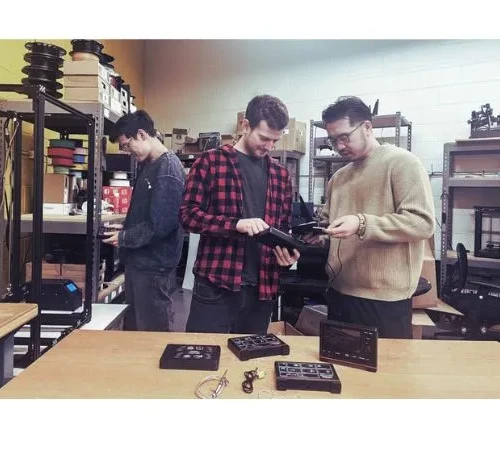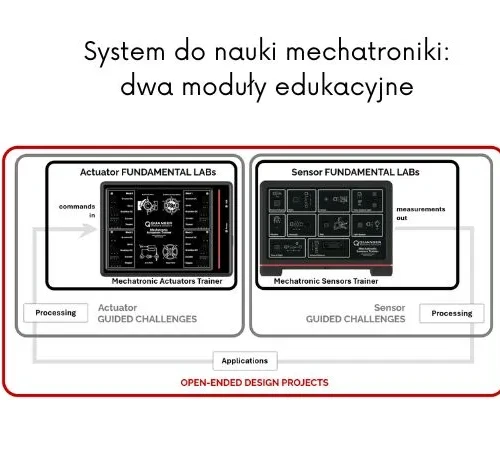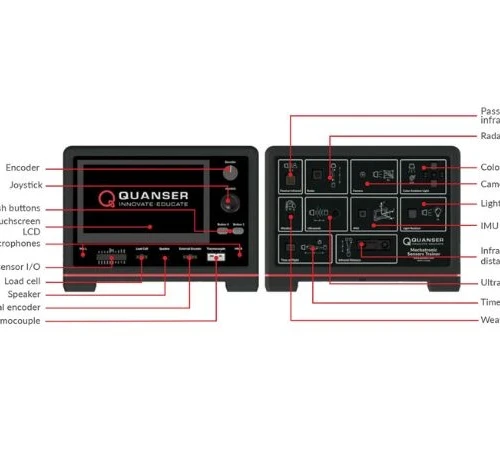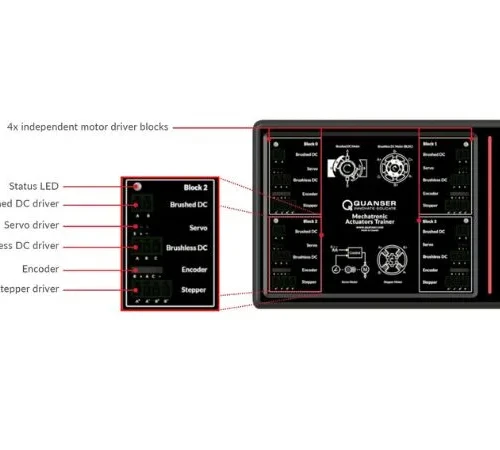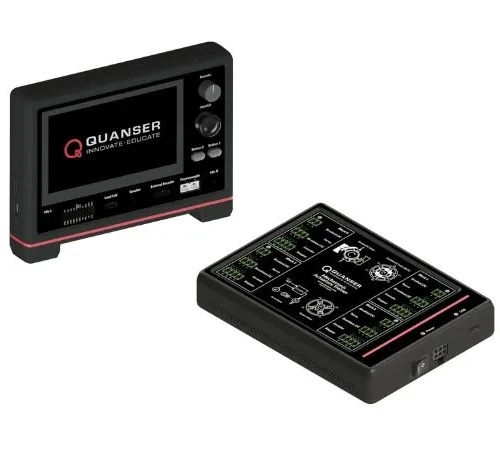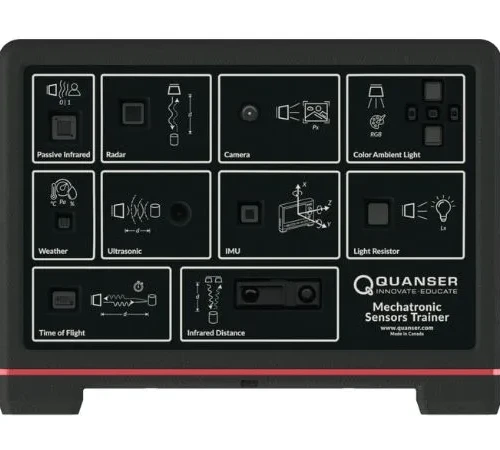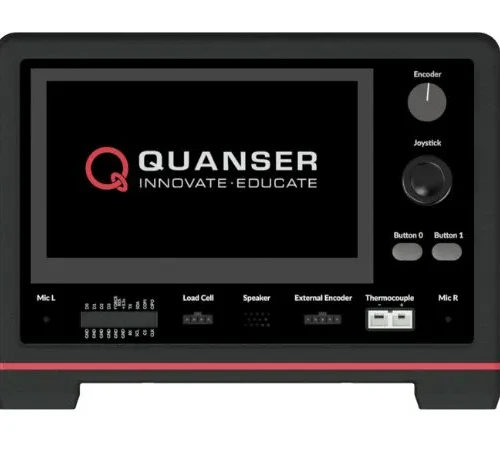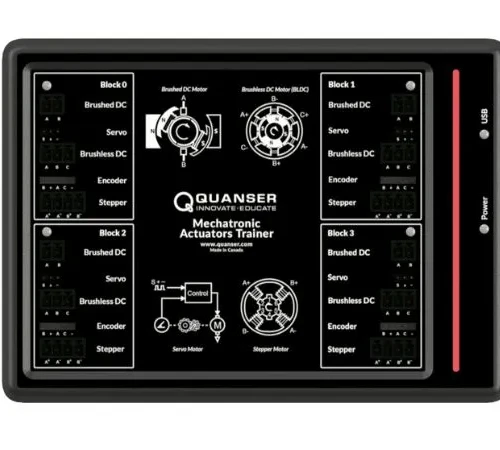Quanser Mechatronic Design Lab
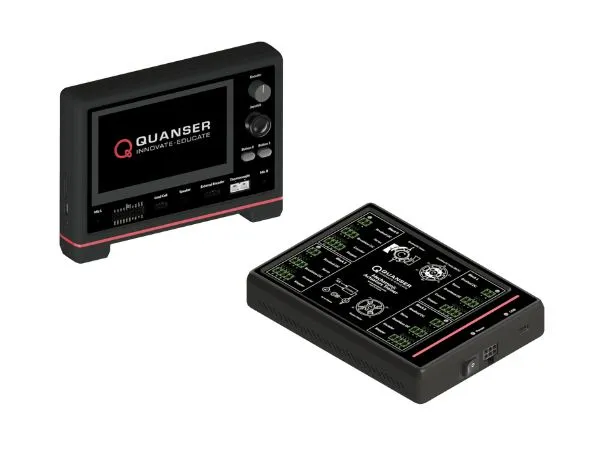
Mechatronic Design Lab
The Mechatronics Design Lab is a modern educational environment that enables students to engage in effective learning, hands-on experimentation, and the development of key competencies in this field.
Courseware
The curriculum is organized into progressive stages – from foundational experiments to more advanced design challenges and open-ended projects. Each stage helps students gain a deeper understanding of how mechatronics is applied in real-world industrial scenarios and prepares them to develop practical engineering solutions.
Mechatronic sensors and asctuators trainers
The lab features the Mechatronic Sensors Trainer and the Mechatronic Actuators Trainer, providing students with essential skills in analyzing and designing mechatronic systems. With its intuitive interface and ready-to-use teaching materials, students can thoroughly explore the workings of the fundamental components of any mechatronic system
INQUIRY
Mechatronic Sensors Trainer | |
| Dimensions | 18 cm x 13 cm x 3 cm |
| Connection Interface | USB, SD Card |
| Sensors | Passive infrared sensor for motion detection |
| Multi-object 60GHz pulsed coherent radar system | |
| Reflective Infrared distance module | |
| Multi-object ultrasonic distance sensor | |
| 64 zone time of flight distance sensor | |
| Camera | |
| Color sensor w/ RGB/ambient/optical-IR ranges and 4x RGB/IR LEDs | |
| Ambient light dependent resistor | |
| Nine axis IMU w/ accelerometer, gyroscope and magnetometer | |
| Weather module with pressure, temperature and humidity | |
| Encoder knob w/ 24 pulses per rev | |
| Joystick w/ two analog axis and button | |
| 2x configurable push buttons | |
| 800 x 480 touchscreen LCD w/ 10-finger multitouch interface | |
| Dual microphones, and speaker | |
| External Sensor Interface | Load cell connector |
| Header – Serial/SPI/I2C, 4 GPIO, force sensing resistor | |
| Thermocouple connector | |
| Encoder connector w/ 32-bit quadrature decoding | |
| External Sensors provided | Load cell |
| Force sensing resistor | |
| Thermocouple | |
| Language support | Python / C / MATLAB / Simulink |
Mechatronic Actuator Trainer | |
| Dimensions | 18 cm x 13 cm x 3 cm |
| Connection Interface | USB External power supply |
Actuators Interface | Brushed DC Motor |
| Brushless DC Motor | |
| Stepper Motor | |
| Servo Motor | |
Actuator Feedback
| Rotary position (encoder) |
| Rotary speed (tachometer) | |
| Current sense | |
Language support
| Python / C / MATLAB / Simulink |
Mechatronic Sensors Trainer
An innovative tool for mechatronics education, the mechatronic sensors trainer features a wide range of sensors, including distance, motion, environmental, light, force, and touch sensors. It enables students to explore sensor operation principles while enhancing their skills in component selection and design decision-making for complex measurement and perception systems.
With real-time measurement capabilities, the mechatronic sensors trainer can be integrated into larger systems or used to extend the functionality of the QBot Platform and QCar 2. Additionally, it supports asynchronous data collection and storage, allowing for offline data processing.
Courseware
Fundamental Labs – understanding different types of sensors, data acquisition and processing, and component selection.
Integration Challenges – developing design intuition by working with multiple sensors in complex measurement and perception systems.
Projects – open-ended projects inspired by real-world industrial applications, such as mobile robots and smart home systems.
Mechatronic Actuators Trainer
This compact device provides intuitive control of four types of motors: brushed DC, brushless DC, stepper, and servo motors. It features position feedback and current measurement for each motor, allowing students to analyze and optimize motor control systems.
The provided educational materials also cover essential applications such as motor control and transmission mechanisms.
With the ability to control four different actuator types, the Mechatronic Actuators Trainer serves as a key component for student projects, including mobile robots and manipulators. These systems can also be powered, controlled, and integrated with other Quanser solutions, such as the QBot platform.
Courseware
Fundamental Labs – basics of motor operation, hardware interfaces, and motor feedback systems.
Integration Challenges – developing skills in motor selection based on functionality, performance, and applications such as control systems and power transmission mechanisms.
Projects – open-ended projects using the trainer, inspired by real-world applications such as mobile robots and smart home automation.
